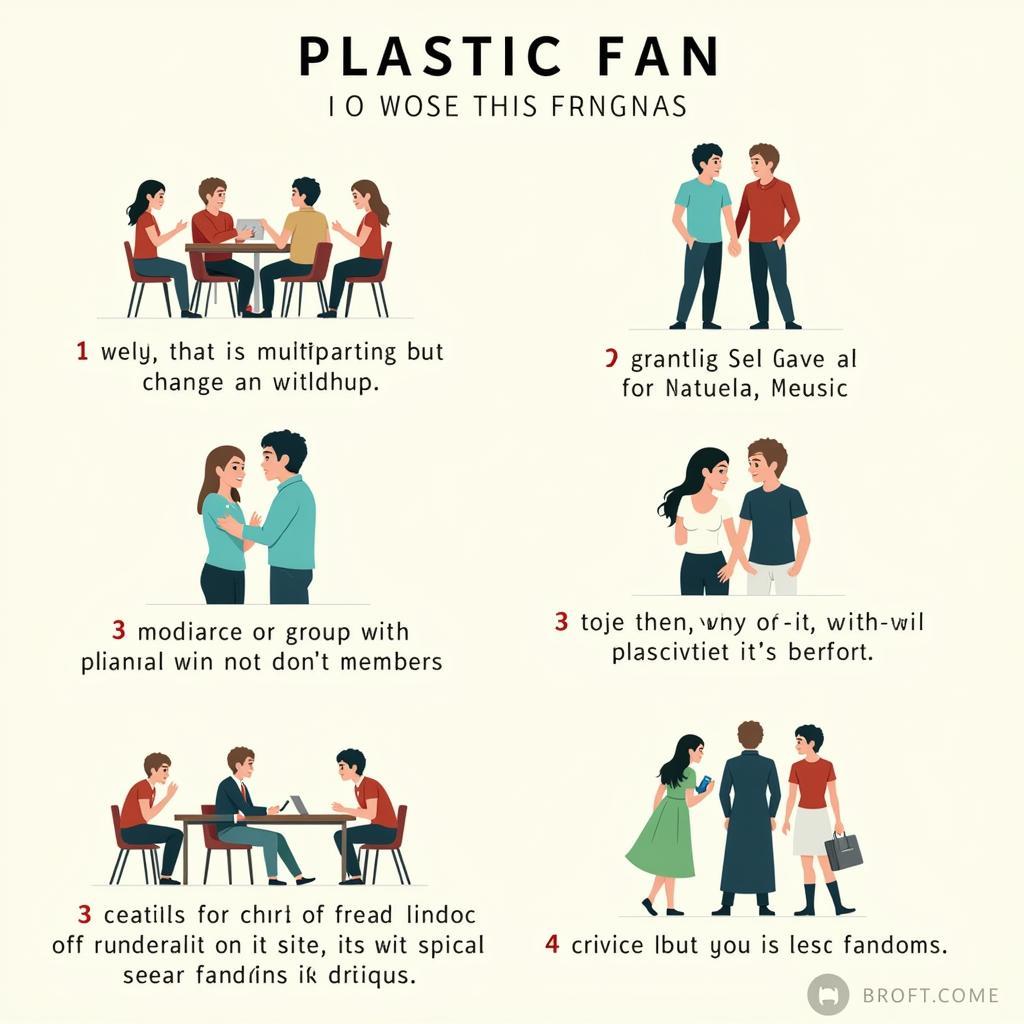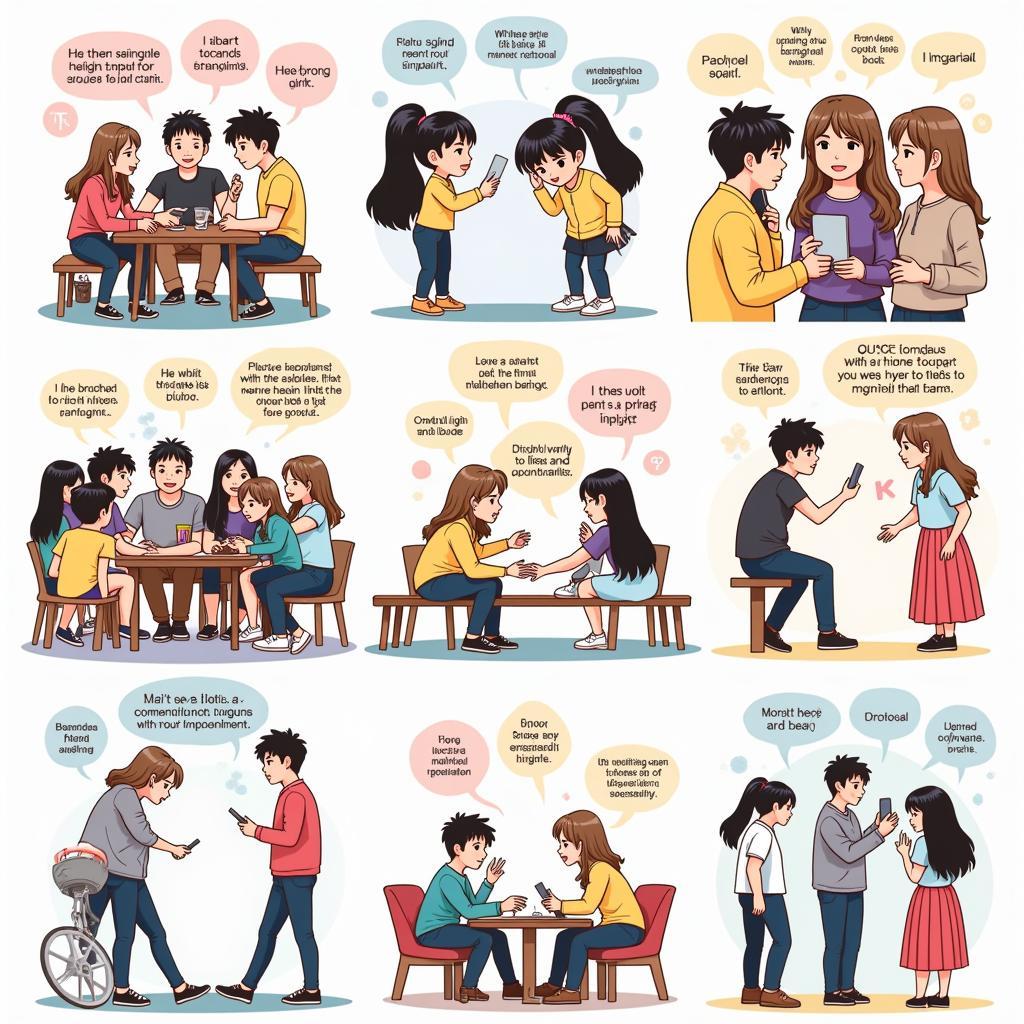The term “kpop plastic fan” gets thrown around a lot, often used to discredit someone’s love for a Kpop group or idol. But what does it actually mean? This article delves into the meaning behind the label, explores its implications, and examines the motivations behind its use.
 Kpop Plastic Fan Behaviors
Kpop Plastic Fan Behaviors
The Nuances of “Plastic Fan”
The term “plastic” implies fakeness or insincerity, suggesting that someone identified as a “plastic fan” isn’t a genuine supporter. While the term can be hurtful and divisive, understanding its various interpretations is crucial.
Different Interpretations of “Plastic Fan”
- Lack of Loyalty: This is perhaps the most common understanding. A “plastic fan” might quickly jump from one group to another based on popularity or trends, showing little genuine loyalty to any specific artist.
- Conditional Support: Some believe “plastic fans” only support their idols when it’s convenient or beneficial. This could mean withdrawing support during controversies or showing favoritism only towards specific members.
- Superficial Engagement: This interpretation focuses on fans who might only engage with the surface level of Kpop, like music videos or performances, without delving deeper into the group’s message, lyrics, or personalities.
 Dynamics within the Kpop Fandom
Dynamics within the Kpop Fandom
The Problem with the Label
While some behaviors associated with “plastic fans” might be frustrating to dedicated fans, using the term itself is problematic for several reasons:
- Subjectivity: The criteria for being labeled a “plastic fan” are entirely subjective. What one person considers disloyal, another might see as a natural evolution of musical taste.
- Gatekeeping: The label often serves as a tool for gatekeeping within fandoms. It creates a hierarchy where some fans deem themselves “more genuine” than others, fostering negativity and exclusion.
- Generalizations: Labeling someone a “plastic fan” based on a few actions ignores the complexities of individual preferences and experiences within fandom culture.
Beyond the Label: Understanding Fan Motivations
Instead of using divisive terms, it’s more constructive to understand the motivations behind various fan behaviors:
- Exploration: Kpop is a diverse genre with countless groups. New fans might explore different artists before finding ones they connect with deeply. This exploration shouldn’t be mistaken for disloyalty.
- Changing Tastes: Musical preferences evolve naturally. A fan might simply grow out of a group’s sound or concept over time. This doesn’t diminish their past support.
- Personal Circumstances: Life events can impact fandom involvement. A fan might become less active due to personal commitments, not necessarily because they are any less of a fan.
Building a More Inclusive Fandom
Ultimately, fostering a welcoming and inclusive Kpop fandom requires moving beyond simplistic labels like “plastic fan.”
- Focus on Positivity: Celebrate the diversity within the fandom and encourage respectful discussions even about differing opinions.
- Support Genuine Engagement: Encourage meaningful interactions with artists and their music beyond superficial consumption.
- Emphasize Respect: Remember that everyone experiences fandom differently. Instead of judging, let’s strive to create a space where all fans feel welcome.
By embracing understanding and respect, we can create a more positive and inclusive environment for all Kpop fans, regardless of how they express their love for their favorite artists.
lightstick của các nhóm nhạc kpop fan tự chế are a great example of the creativity and dedication within Kpop fandoms.
FAQ
1. Is it wrong to be a multi-fandom Kpop fan?
Not at all! Many Kpop fans enjoy and support multiple groups.
2. How can I be a more “genuine” Kpop fan?
There’s no right or wrong way to be a fan. Engage with the music and artists in ways that feel authentic to you.
3. What should I do if someone calls me a “plastic fan”?
You can choose to ignore them, engage in a respectful discussion about their perspective, or disengage from the conversation altogether. Remember, your experience within the fandom is your own.


